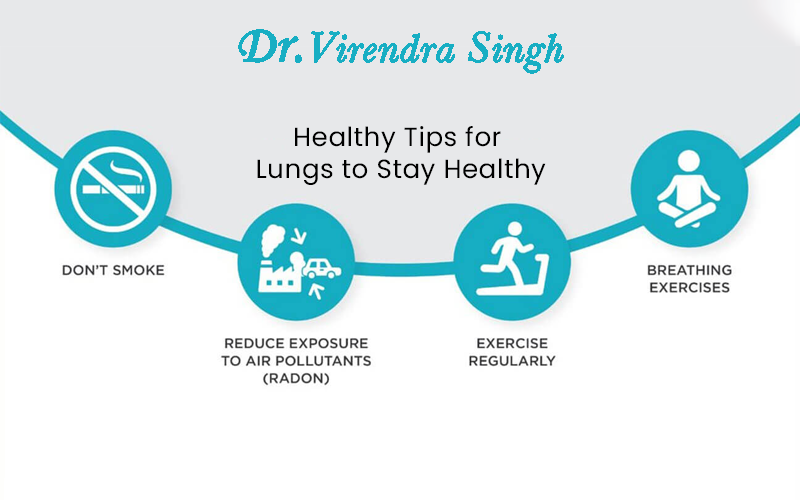
As the cold weather sets in, our lungs can face some extra challenges. Your respiratory health may be impacted by indoor heating, cold air, and an elevated risk of disease. However, you can safeguard your lungs and maintain easy breathing throughout the winter by following a few basic procedures. Dr. Virendra Singh, a renowned pulmonologist, shares valuable insights on maintaining healthy lungs and breathing with ease during winter. He stresses the significance of keeping warm, minimizing cold air exposure, and using a scarf or mask to block allergens and pollution.
Dr. Virendra Singh recommends incorporating deep breathing exercises and staying hydrated to keep airways clear. He suggests abstaining from smoking and limiting exposure to dust and overpowering smells indoors. Regular exercise and a well-balanced diet high in antioxidants are also essential for promoting lung health. Here are some winter safety tips to help you take care of your lungs and stay comfortable throughout the season, regardless of whether you have a lung issue or simply want to stay healthy.
COPD Specialist, Asthma Specialist, ILD Lung Specialist, Sleep Apnea Specialist
Why is Winter Tough on the Lungs?
Lung health faces a number of difficulties in the winter. Your lungs have a tougher time functioning properly in cold air because it tends to dry out the respiratory system. Individuals with chronic obstructive pulmonary disease (COPD), bronchitis, or Asthma may find that this makes their symptoms worse.
Additionally, many people are exposed to allergens including dust mites, mold, and pet dander during the winter months due to an increase in indoor activity. When you combine the seasonal flu with illnesses, it becomes evident why your respiratory system needs particular attention during this time of year.
1. Stay Warm, Breathe Better
Wearing a scarf or muffler when you go outside will help keep your throat and chest warm since cold air can irritate your airways and cause breathing problems. The air becomes warmer before it reaches your lungs when you breathe via your nose instead of your mouth. Purchase a face mask made to filter pollutants and cold air if your lungs are sensitive.
2. Maintain Indoor Air Quality
As more time is spent indoors during the winter, indoor air quality must be a primary concern. Follow these steps to create a lung-friendly environment.
- Use a Humidifier: Your lungs may get irritated by dry indoor air. By maintaining ideal moisture levels, a humidifier facilitates breathing.
- Ventilate Regularly: To promote air circulation and lessen the accumulation of interior pollutants, open windows from time to time.
- Keep Allergens in Check: Wash bedding in hot water, vacuum to minimize allergens, and dust your home regularly.
3. Watch Out for Air Pollution
Air pollution levels frequently increase during the winter months as a result of industrial activities, car emissions, and heating systems. Poor air quality can impact lung health.
- Monitor AQI: Keep an eye on your local Air Quality Index (AQI). On days when the AQI is high, stay indoors.
- Invest in Purifiers: By lowering dangerous particles in the air you breathe, a good air purifier can be a lifeline for city people.
4. Guard Against Winter Illnesses
Your lungs may be strained by typical wintertime seasonal illnesses including the flu, colds, and respiratory infections. Protect yourself with these tips:
- Get Vaccinated: Pneumonia and Flu vaccines can significantly reduce your risk of severe respiratory infections.
- Practice Good Hygiene: Avoid touching your face, cover your mouth when sneezing or coughing, and wash your hands frequently.
- Boost Immunity: Eat a balanced diet rich in vegetables, fruits, and immune-boosting nutrients like Zinc and Vitamin C.
5. Stay Active Indoors
Your lungs stay strong when you exercise regularly, but in the winter, it may not always be the best idea to work out outside in the cold. To preserve lung capacity without exposing oneself to cold temperatures, use indoor exercises like yoga, stretching, or mild aerobics. Additionally, breathing techniques like diaphragmatic or pursed-lip breathing can help reduce stress and enhance lung function.
6. Avoid Smoke and Irritants
Smoke from wood-burning stoves, fireplaces, and even candles can irritate your lungs by releasing dangerous particles into the atmosphere. Restrict your exposure to these sources and abstain from smoking. To keep your interior air quality from being impacted by secondhand smoking, if you live with a smoker, encourage them to smoke outside.
7. Stay Hydrated
Hydration is often overlooked during winter, but it’s just as important as in the summer. Water consumption lowers your risk of respiratory infections by keeping mucus in your airways thin, which facilitates its expulsion. Warm drinks like soups or herbal teas can also soothe irritated airways.
8. Manage Chronic Conditions Proactively
Consult your physician to modify your winter treatment plan if you already have a lung disease such as asthma or chronic obstructive pulmonary disease (COPD).
- Carry Your Medication: Always have your inhaler or prescribed medication with you.
- Use Preventive Measures: To prevent flare-ups, use preventative inhalers as directed by your physician.
- Avoid Triggers: Recognize and stay away from some triggers that can exacerbate your symptoms, such as potent perfumes or cleaning supplies.
9. Quit Smoking if You Haven’t Already
Whatever the season, quitting smoking is a big step to better lung health. Winter is the best time of year to make this crucial choice. If needed, seek support through helplines, therapy, or nicotine replacement therapies.
10. Know When to Seek Help
Your greatest efforts may not always be enough to prevent lung-related problems. Recognizing when professional assistance is required is crucial. Seek medical attention if you notice:
- Chest tightness or pain.
- Shortness of breath, even at rest.
- Frequent respiratory infections.
- Persistent coughing or wheezing.
FAQs
How can I protect my lungs from cold air?
Cover your mouth and nose with a scarf or mask to warm the air before it enters your lungs.
What foods help improve lung health?
Foods rich in antioxidants like spinach, citrus fruits, and nuts can support lung health.
Why is hydration important for lung health?
Water consumption keeps the mucus in your airways thin, which facilitates lung clearance.
Should I exercise during winter for healthy lungs?
Yes, walking or yoga are examples of indoor exercises that increase lung capacity without exposing you to chilly air.
How can I reduce indoor air pollution in winter?
To reduce dust and allergies, use air purifiers, clean frequently, and refrain from smoking indoors.
